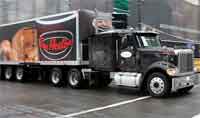| |
|
| |
|
 |
Supply
Chain by the Numbers |
| |
|
| |
- April 19, 2018 -
|
| |
|
| |
|
| |
|
| |
Tesla Robots Just Not Working; IMF Predicts Strong Global Economic Growth; Amazon FC Workers Using Bottles Instead of Toilets? Tim Hortons Tells Franchisees to Buy Supplies from Walmart |
| |
|
| |
| |
| |
$50.00 |
|
That's about all the net savings per car that Tesla is likely to achieve from its automation of the final assembly process, according to a recent analysis from Max Warburton and Toni Sacconaghi of Wall Street firm Bernstein. They say much of the savings in factory labor is likely lost with expensive technicians and engineers to keep the automation going. What's more, the robots are hard to scale, the analysts say. In fact, Warburton, who earlier was at the International Motor Vehicle Program at MIT, wrote that "automation in final assembly doesn't work." The research note says that Japanese car companies limit automation because it "is expensive and is statistically inversely correlated to quality." Looks like Tesla founder Elon Musk now agrees. This week on a television interview, Musk said "We had this crazy, complex network of conveyor belts….and it was not working, so we got rid of that whole thing."
|
|
|
| |
| |
|
|
|
That's how many flights of stairs workers on the fourth mezzanine level at an Amazon fulfillment center in the UK need to walk down to get to the nearest restroom – while other workers have quarter mile, 10-minute walks to the "loo," as they say across the pond. Those circumstances lead many workers to operated a "toilet bottle" system, according to undercover investigator James Bloodworth, who is writing a book on the low wage economy in Great Britain. "People just peed in bottles because they lived in fear of being disciplined over 'idle time' and losing their jobs just because they needed the loo," Bloodworth told The Suns newspaper. He also claimed workers are continually monitored by supervisors for wasting time. Bloodworth added that the FC he worked in is like a prison, with airport-style security scanners and where workers are checked and patted down in search of stolen goods. An Amazon spokesman, however, told The Sun that "Amazon ensures all of its associates have easy access to toilet facilities, which are just a short walk from where they are working."
|
| |
| |
|
| |
| |
45 |
 |
That, interestingly, is the number of SKUs Canadian restaurant chain Tim Horton's is telling many of its franchisees in an email…. to source from Walmart! The list of 45 "temporarily unavailable" items from the coffee and doughnut chain's facility in Guelph, Ontario includes take-home packages of the company's own Tim Hortons brand of coffee and single-serve pods, soda pop, bottled water, hot and iced teas, garbage bags and vinyl kitchen gloves. Normally, of course, Tim Hortons restaurant owners are legally required as part of their franchise agreements to buy most of such items directly from head office, not through a third-party retailer or supply company. The email, obtained by Canada's Financial Post, references a supply "interruption" that occurred more than a week ago at the Guelph DC, which serves more than three-quarters of Tim Hortons' roughly 1,750 stores in the province. |
| |
| |
|
|
|
| |
 |
 |
| |
|
|
| |